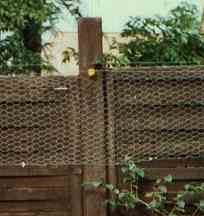

The total size of my garden is about 1000 m²
(about 1195 square yard), but fenced in are only about 600 m².
We live next to a main road and to the left and
to the right are rather nitpicky neighbours, so on the one hand it would
be much too dangerous to just *let the cats go outside*, on the other hand
it would be really impudent to let the cats get to the kitchen gardens
of the neighbours.
So we needed a fence!
The cats only laughed about the plain wire netting. After unsuccessfully trying out a lot of different possibilities, I finally read in a cat magazine the words "escape proof" and "electrical". After searching for information, I found out that a -weak!!- transformer for electrical fences (thanks, JD!) is the crucial utensil!
And this is how I installed it:
I took special isolaters and fastened them to
the posts. Then I pulled the electrical wire though them and fastened it
at the other end (my fence goes in a U-Form). Of course one end needs to
lead to the transformer.
Since one has to touch ground in order to get
a electric shock, I had to build an "artificial ground", which I have done
by using chicken wire, which was fastened right underneath the upper edge
of the fence and connected to the *real ground* through another wire.
First time all the cats were permitted outside
again, six or seven cats saw their chance and tried to escape. So they
climbed on top of the fence, took one fast look around -- and got shocked!
Scared, they jumped on the wrong side of the fence, but were very thankful
that we carried them with a few nice words inside again.
But this only happened with six or seven cats,
the others didn't even try.
And now the transformer has been unused in the
shed for quite a few months already. And hopefully it will stay there.
Home